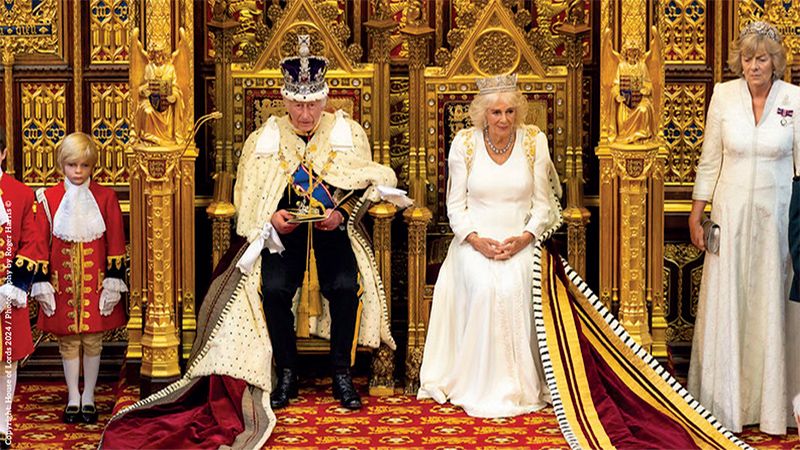The government is “committed to a clean energy transition that will lower bills for consumers over time,” King Charles III revealed in his speech yesterday (17 July).
Speaking on behalf of the Labour government’s new proposed legislation – which includes the nationalisation of rail operators and the creation of a publicly-owned clean power company – the King announced a bill will be introduced to set up a new publicly-owned power company, Great British Energy, headquartered in Scotland. This is expected to help accelerate investment in renewable energy, such as offshore wind.
The King also said legislation will be brought forward to help the country achieve energy independence – and he mentions a bill to support “sustainable aviation fuel production”, as well as producing new job opportunities that can come from the “technologies of the future”.
Further, the King highlighted the need to improve water quality, saying legislation will be introduced to strengthen the powers of the water regulator.
Richard Lum, managing partner and co-chief information officer at Victory Hill Capital Partners, reacted: “The new government’s plan to invest £8.3bn to fund GB Energy, a publicly-owned green power company, is a welcome step but as with all such programmes, the devil is in the detail.
“Their ambition to scale investment in wind and solar is laudable but does not address the intermittency issues we face. Further investment in nuclear technology meanwhile will take time and need to consider the construction, raw material extraction and decommissioning issues as part of any power station lifecycle.
“The interesting area will be the government’s co-investment plans alongside the private sector to support new technologies such as tidal power, carbon capture and green hydrogen. Meeting the twin goals of energy security through clean energy will require investment in a wide range of technologies across the UK, basing energy production sources near demand centres and some careful national coordination. The ambition is there, we just need to make sure that the enthusiasm is channelled in the right direction.”
Tommy Kristoffersen, manager of the EdenTree Green Infrastructure fund, added: “We were pleased to hear King Charles announce today that legislation would be brought forward to accelerate investment in renewable energy and help the country achieve energy independence.
“In the course of its short tenure in power thus far, the Labour government has shown a real willingness to create rapid and meaningful change in the green energy space. Last week, new chancellor Rachel Reeves arguably did more for onshore wind development in England in 72 hours than previous governments had done in over a decade by removing the restrictive clauses which had made onshore wind development nigh on impossible since 2015, marking a significant advancement in renewable energy support and opening up a pipeline of investment potential.
“Such willingness bodes well for another area that has so far been hindered by planning constraints: the expansion of the grid. In its manifesto, Labour had identified the grid as the single biggest obstacle to the deployment of cheap, clean power. Today’s announcement of the establishment of state-backed power company Great British Energy should perhaps not be over-egged, as its potential will be limited by its relatively small size, but one thing it should be in a position to do is coordinate procurement and support standardisation across the grid supply chain.
“Similar approaches have already seen some level of success in countries like Germany and the Netherlands, and we think this would be similarly supportive in the UK.”
Isabella O’Dowd, WWF’s head of climate policy, added there are the huge opportunities for jobs, warm homes, lower bills and energy security by tackling climate change: “The creation of GB Energy will give a vital boost to the economy as well as helping us meet our legally-binding climate targets but we need to close the gap on ambition across all sectors
“We hope that by the COP29 climate summit in November, the government will have addressed the concerns of the Climate Change Committee and will once again be in a position to show global leadership on the most important challenge facing both people and the planet.”
Joe Dharampal Hornby, head of public affairs at the UK Sustainable Investment and Finance Association, also added his voice to the positive sentiments around the creation of GB Energy, but warned that it must “go hand in glove with measures to address wider economic barriers”.
Additionally, he said that already removing the de-facto planning ban on onshore wind is a statement of intent from the new government, but it is only part of the solution.
“We know funds are looking to invest in Britain’s sustainable future, but to do so, they need streamlined planning processes, grid upgrades that mean they can plug in their projects and long-term certainty on pricing mechanisms, such as Contracts for Difference. Targeted capital aimed at de-risking projects in areas facing constraint – through the likes of GB Energy – alongside this wider economy reform, can position the UK as a global leader in clean energy investment and innovation.
“Commitments to deliver high-quality infrastructure and housing through the Planning and Infrastructure Bill, meanwhile, should accompany efforts to improve the poor energy efficiency of the UK’s housing stock. Measures to accelerate the uptake of heat pumps, insulation, and green mortgages should be explored as a matter of priority.
“Finally, UKSIF welcomes the government’s announcement of the Draft Audit Reform and Corporate Governance Bill in today’s King’s Speech. The creation of a new Audit, Reporting and Governance Authority with powers to investigate misleading financial reporting is a crucial step towards enhancing corporate accountability and maintaining the UK’s position as a leading global financial and business centre.”








